
Former DOE official accused of stealing luggage arrested as ‘fugitive from justice’
Sam Brinton, the former Department of Energy official who was accused of stealing a Tanzanian fashion designer’s dresses from her airport luggage, has been arrested as a “fugitive from justice” by Maryland police. Brinton was reportedly taken into custody in Rockville, Maryland by police on Wednesday, according to police records. The specific reason for Brinton’s arrest was not immediately available. They previously oversaw nuclear waste policy at the DOE’s Office of Nuclear Energy, but more recently has been battling charges related to luggage theft in both Nevada and Minnesota. Brinton was charged in October for allegedly stealing a traveler’s bags worth a total of $2,325 from the Minneapolis-St Paul Airport on 16 September. They were charged again in early December by Las Vegas prosecutors with grand larceny of an item with a value between $1,200 and $5,000.
2023-05-19 02:24

Republican-appointed federal judges grill FDA in mifepristone hearing
A combative three-judge panel at one of the most conservative courts in the country grilled attorneys for the federal government and a drug manufacturer as anti-abortion activists continue a legal battle to overturn the government’s approval of a widely used abortion drug. On 17 May, the case against mifepristone returned to the Fifth Circuit Court of Appeals in New Orleans, where attorneys for the US Department of Justice and drug manufacturer Danco Laboratories faced skeptical Republican-appointed judges hearing oral arguments in a case that could upend abortion care for millions of Americans. Within seconds of her opening argument, Justice Department attorney Sarah Harrington was interrupted by Judge James Ho, a Donald Trump appointee, who challenged her description of the legal challenge against the drug’s approval by the US Food and Drug Administration. “I don’t think there’s ever been any court that has vacated an FDA determination that a drug is safe to be on the market,” she replied. “FDA can make that determination based on exercising its own scientific expertise, but it’s not a court’s role to come in and second-guess that expertise.” “Why not focus on the facts,” Judge Ho said, “rather than this ‘FDA can do no wrong’ theme.” The judges repeatedly interrupted Ms Harrington and appeared sympathetic to the plaintiffs: an anti-abortion group represented by influential right-wing legal group Alliance Defending Freedom, whose senior counsel Erin Morrow Halley – the wife of Republican senator Josh Hawley – baselessly asserted that medication abortion is “particularly dangerous”. Judge Jennifer Walker Elrod, who was appointed by George W Bush, also took a moment to chastise lawyers for their “unusual remarks” in filings objecting to the widely derided lower-court decision from a former right-wing activist attorney who was appointed to the federal bench by Mr Trump. Judge Elrod suggested their criticisms amounted to personal attacks and suggested that the attorney retract the statements and apologise. “Those statements reflect our view that the district court was very outside the bounds,” said Jessica Ellsworth, an attorney for Danco. “I don’t think those remarks, any of them, were intended as any personal attack.” The judges are not expected to rule immediately. But a decision from the panel judges – each with a history of support for abortion restrictions – is likely to return the case to the US Supreme Court, which has paused any action on mifepristone until the legal challenge plays out. In her arguments, Ms Hawley conflated the risk of serious complications from mifepristone – which is less than 1 per cent – with the risk that a medication abortion failed and would then require medical attention. Her arguments suggested that doctors are enduring a moral harm by providing abortion care, without evidence that doctors have been forced to do so, while also claiming that the FDA illegally approved the drug when it was approved more than 20 years ago. The judges repeatedly questioned the FDA’s approval process for mifepristone, which plaintiffs argued was done too hastily through an expedited process that is typically reserved for treating serious or life-threatening illnesses. But the FDA did not do that with mifepristone; it took years of study before the FDA’s approval. The part of that process that the agency invoked for mifepristone’s approval allowed the FDA to add safety restrictions, such as a requirement that physicians be able to diagnose ectopic pregnancies. But judges appeared to argue that because pregnancy is not an illness, mifepristone should not have been approved through that process at all, repeating plaintiffs’ false claim that the FDA called pregnancy a “life-threatening illness.” “When we celebrated Mothers’ Day, were we celebrating illness?” Judge Ho said at one point. “The arguments today demonstrated in detail that the case has no legal or scientific merit and should have been laughed out of court from the very start,” Jennifer Dalven, director of the ACLU Reproductive Freedom Project, said in a statement. “Unfortunately, the deck is stacked as the judges hearing this case are well known for their extraordinary hostility to abortion,” she added. “The whole point of the case is to prevent anyone in America, no matter where they live, from using a medication that has been safely used in this country for decades and is used in most abortions today.” Major medical groups and research from hundreds of studies over the last two decades have confirmed the overwhelming safety and efficacy of the drug, one of two drugs used in a two-drug protocol for a medication abortion, the most common form of abortion care in the US. Studies show it is as safe to use as common over-the-counter pain relievers like ibuprofen and acetaminophen, and the protocol for medication abortion is used in more than 60 other countries. The drug was first approved by the FDA in 2000 and is approved for use up to 10 weeks of pregnancy. A vast majority of abortions occur within the first nine weeks of pregnancy. From 2019 through 2020, nearly 93 per cent of all abortions were performed before the 13th week, according to the US Centers for Disease Control and Prevention. Mifepristone is also used to treat miscarriages. Roughly 10 per cent of clinically recognised pregnancies end in miscarriages, according to the American College of Obstetricians and Gynecologists. The American College of Obstetricians and Gynecologists and the American Medical Association also joined a brief in the challenge opposing arguments from anti-abortion groups. Last year, Alliance Defending Freedom filed a lawsuit in US District Court in Amarillo, Texas on behalf of a group of anti-abortion activists incorporated as the Alliance for Hippocratic Medicine, which was organised that same month with an address in Amarillo. The Alliance Defending Freedom also led the challenge at the Supreme Court that ultimately struck down Roe v Wade. In April, US District Judge Matthew Kacsmaryk – a former right-wing activist lawyer who was appointed to the federal judiciary by then-President Trump – issued a ruling to suspend the FDA’s approval of mifepristone, which was immediately challenged by abortion rights advocates, providers, major medical groups, drug manufacturers and the Biden administration. An appeal landed at the Fifth Circuit court, which has jurisdiction over the Amarillo court. A three-judge panel blocked a part of the judge’s ruling, and a subsequent ruling at the Supreme Court paused the lower-court ruling as the legal challenge continues. Read More North Carolina Republicans approve 12-week abortion ban as sweeping restrictions spread across US South Nebraska Republicans approve combined gender-affirming care ban and anti-abortion bill after epic filibuster Anti-abortion laws harm patients facing dangerous and life-threatening complications, report finds A Texas man sued his ex-wife’s friends for allegedly helping her with an abortion. Now they’re suing him Louisiana Republicans refuse rape and incest exceptions to state’s sweeping anti-abortion law What is mifepristone? The widely used pill in the abortion rights battle at the Supreme Court
2023-05-18 06:21

North Carolina Republicans approve 12-week abortion ban as sweeping restrictions spread across US South
Republican lawmakers in North Carolina voted to override the governor’s veto of a bill that outlaws abortion at 12 weeks of pregnancy, restricting abortion access in a state that has been a haven for abortion care in the year after the US Supreme Court’s decision to reverse Roe v Wade. In neighbouring South Carolina, lawmakers have continued debate before voting on a more-restrictive measure that would ban nearly all abortions after roughly six weeks of pregnancy, before many people know they are pregnant, adding to a streak of abortion restrictions across the US South. More than a dozen states, mostly in the South, have outlawed most abortions or severely restricted access within the year after the Supreme Court’s ruling in Dobbs v Jackson Women’s Health Organization, which revoked a constitutional right to abortion care that was affirmed for nearly half a century. Abortion rights restrictions in North Carolina and a six-week ban in South Carolina would dramatically change the map for abortion access in the US, where abortions are banned in most cases from Texas to West Virginia and along the Gulf Coast. “In the more than a dozen states with bans, women have been turned away from emergency rooms, left with no choice but to travel hundreds of miles for the care they need, and faced complications that put their lives and health at risk. Like those laws, the North Carolina ban will harm patients and threaten doctors for providing essential care,” White House press secretary Karine Jean-Pierre said in a statement on 17 May. She called the North Carolina measure a “dangerous bill that is out of touch with the majority of North Carolinians and will make it even more difficult for women to get the reproductive health care they need.” “We’ve already seen the devastating impacts that state abortion bans have had on the health and lives of Americans living under these draconian laws,” she added. Health workers joined protesters at the North Carolina Capitol in Raleigh on 17 May as lawmakers in the Republican-controlled state legislature convened to override a veto from Democratic Governor Roy Cooper, who has spent the last several days campaigning for GOP lawmakers to break from the party and drop the challenge to his veto. In a video posted online, the governor named four Republican lawmakers who he said made campaign promises to protect access to abortion. “They say this is a reasonable 12-week ban. It’s not,” he said in the video. “The fine print requirements and restrictions will shut down clinics and make abortion completely unavailable to many women at any time, causing desperation and death.” Much of the coverage surrounding the North Carolina legislation has centred around a now-Republican lawmaker who previously campaigned against abortion restrictions when she was a Democrat, up until April. State Rep Tricia Cotham joined the Republican Party last month after campaigning for her seat as a Democratic candidate and earning the endorsement of EMILY’s List, an influential abortion rights organisation. Her party switch delivered Republicans a veto-proof majority in the House. Ms Cotham has spent years campaigning against abortion restrictions, with powerful testimony about abortion rights and her own medically necessary abortion experience, saying in one widely shared 2015 speech that “my womb and my uterus is not up for your political grab.” In a statement following the vote, the governor said that “North Carolinians now understand that Republicans are unified in their assault on women’s reproductive freedom, and we are energized to fight back on this and other critical issues facing our state.” Lawmakers in the House and Senate voted on party lines to reverse the governor’s veto. The bill includes exceptions for pregnancies from rape or incest or if there is a “life-limiting anomaly” in the fetus. It also will require in-person physician visits at least 72 hours before a procedural abortion, and doctors must also make real-time views of fetuses available and allow patients to listen to embryonic cardiac activity. North Carolina lawmakers approved the anti-abortion law while lawmakers in Nebraska debated a measure that coupled a 10-week abortion ban with a bill targeting gender-affirming care for trans youth, a proposal that inspired a nearly three-month-long filibuster in an effort to block it. Republican lawmakers ultimately broke through the filibuster on Tuesday night and voted in favour of the combined bill, which will head to a final round of votes before it heads to the desk of Republican Governor Jim Pillen, who intends to sign it into law. Meanwhile, in Louisiana, lawmakers recently refused to add rape and incest exceptions to its anti-abortion law, one of the most restrictive in the country. State lawmakers also overwhelmingly rejected attempts to clarify medical exceptions in the law, including a measure that would specifically allow providers to remove an ectopic or molar pregnancy, which cannot result in a successful birth. Read More Nebraska Republicans approve combined gender-affirming care ban and anti-abortion bill after epic filibuster Anti-abortion laws harm patients facing dangerous and life-threatening complications, report finds
2023-05-17 23:51

Trump takes credit for overturning of Roe v Wade while raising questions about DeSantis’ six-week ban
Former president Donald Trump is taking credit for the US Supreme Court overturning Roe v Wade last year by claiming he nominated the justices who did not agree with the 1973 precedent. On Tuesday night’s episode of Rob Schmitt Tonight on Newsmax, Mr Trump compared his action against abortion to Florida Governor Ron DeSantis’, saying he has done more for pro-life people. “First of all, I’m the one that got rid of Roe v. Wade and everybody said that was an impossible thing to do,” Mr Trump boasted. Mr DeSantis recently signed into law a six-week ban that prevents anyone from seeking an abortion after six weeks of gestation, with the exception of cases where ending a pregnancy would save the mother’s life. As of now, Florida allows abortions for pregnancies involving rape or incept until 15 weeks of gestation, so long as the mother can provide documentation such as a restraining order or police report. But despite Florida’s harsh move to restrict abortion access, Mr Trump believes he should be receiving more credit for the work he’s done. “What I’ve done is given the pro-life people, who are wonderful people and loving people, I’ve given them the power of negotiation. Because now they’re able to negotiate something that is going to be very important,” Mr Trump said. During his presidential term, Mr Trump nominated three Justices to the Supreme Court - Neil Gorsuch, Brett Kavanaugh and Amy Coney Barrett. All three Justices joined the majority opinion of Dobbs v Jackson last summer to help overturn Roe v Wade as well as Planned Parenthood v Casey. This returned the legality of abortions to each state individually. As of May 2023, 19 states have banned abortions either fully or restricted until a certain week of gestation, including Florida. “DeSantis, or Ron Desanctimonious as I call him, he came out with the six weeks — other people agree with and a lot of people don’t,” Mr Trump said. The former president used Mr DeSantis’ recent ban to highlight how unpopular he is with female voters — indicating the ban is too restrictive. “Ron, if you take a look, he’s losing women voters like crazy,” Mr Trump said before citing several news stories about Mr DeSantis’ unpopularity with women. The former president has been comparing himself positively to Mr DeSantis in the last few months as rumours are swirling that Mr DeSantis is preparing to announce his bid for Republican presidential candidate. “I don’t do it for the women, for the men, I do what’s right,” Mr Trump added. It is thought that Mr DeSantis could be a leading contender for Republicans, making him a possible threat to Mr Trump’s campaign. As of recently, any opportunity Mr Trump has to criticise Mr DeSantis, he takes it — as evidenced by the Newsmax interview. Mr Trump both credited himself with overturning Roe v Wade while asserting that Mr DeSantis was unpopular with women due to Florida’s six-week ban. Mr Trump has changed his opinion on abortion throughout his life. In the 1990s the former president claimed he was pro-choice but by 2015 he told reporters he was pro-life. In 2016, Mr Trump said he would have “preferred” if abortion were up to the States but accepted the federal law. After implementing the three Justices who overturned Roe v Wade last year, Mr Trump took credit for the decision. But since then, the former president has never made it clear at what point in gestation abortions should be illegal. Read More DeSantis reacts to Trump implying Florida abortion ban is ‘too harsh’ as 2024 fight heats up Abortion after 12 weeks banned in North Carolina after GOP lawmakers override governor’s veto Abortion pill case moves to appeals court, on track for Supreme Court Ivanka and Jared split over attending Trump 2024 launch – follow live Why was Donald Trump impeached twice during his first term? Four big lies Trump told during his 2024 presidential announcement
2023-05-17 22:58
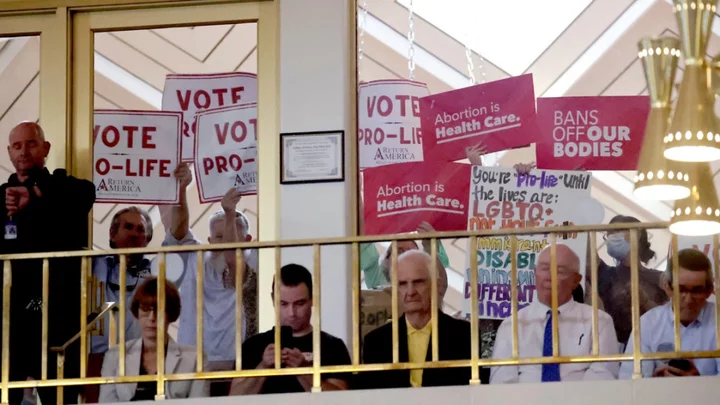
Key abortion debates this week in US courts and statehouses
Abortion opponents are trying again to implement restrictions in the latest round of court and legislative action on the divisive issue. This round of efforts centers on states that have considered bans before and a policy that's been bouncing around federal courts. Here are key things to know about the latest developments in the saga of how abortion policy will settle after the U.S. Supreme Court last year overturned Roe v. Wade and the nationwide right to abortion. PURPLE STATE POLICY Since the Dobbs ruling last year, tighter abortion restrictions have been enacted in most Republican-controlled states and protections of abortion access have gone into effect in most that are dominated by Democrats. But there hasn't been such a uniform story in the 11 states with divided government control. Virginia has kept its status quo, for instance, while Vermont has adopted a constitutional amendment to preserve abortion access and Louisiana and Kentucky have bans in place. Change came quickly in North Carolina in April when one state lawmaker flipped from Democrat to Republican, giving the GOP enough votes to override gubernatorial vetoes. Lawmakers promptly passed a ban that's less restrictive than most — allowing abortion for the first 12 weeks of pregnancy, which would be among the least restrictive of the new bans. Democratic Gov. Roy Cooper vetoed it. But lawmakers on Tuesday overrode that veto and the new law is set to take effect July 1. TRYING AGAIN ON BANS IN NEBRASKA, SOUTH CAROLINA Nebraska and South Carolina are both Republican-dominated states where GOP lawmakers have struggled to agree on the details of abortion bans. Both are considering bans this week, just weeks after earlier efforts narrowly fell short on procedural votes. And both have resurrected legislation that's less restrictive than versions that were rejected previously. In South Carolina, Republican lawmakers were divided on whether to ban abortion at all stages of pregnancy or only after cardiac activity can be detected — generally around six weeks, often before women know they're pregnant. A version of a less stringent ban is now under consideration. In Nebraska, lawmakers balked at a ban after six weeks. The unique unicameral legislature is now considering a ban on abortion at 12 weeks' gestation. It's been added to a bill that would also ban gender-affirming care for minors. RESTRICTION IN MONTANA In Montana, Gov. Greg Gianforte signed a ban Tuesday on dilation and evacuation abortions, which are normally performed in the second trimester of pregnancy. A legal challenge is expected. And it wouldn't be the first challenge on the policy in the state. A judge ruled last month that she would not block the ban preemptively, before it was signed into law. The state in 2021 adopted a broader ban on abortions after 20 weeks of pregnancy, but the state Supreme Court ruled that it will not enforce it pending a court challenge, leaving abortions by some means legal until viability, around the 24th week. COURT ARGUMENTS ON AN ABORTION PILL Most of the legal battles on abortion since the Supreme Court’s Dobbs decision in 2022 have centered on whether individual state constitutions protect the right to abortion. But one has implications nationally. An anti-abortion group sued seeking to rescind the U.S. Food and Drug Administration’s 2000 approval of mifepristone, one of two drugs used in combination in most medication-induced abortions in the U.S. A federal judge in Texas agreed. The New Orleans-based 5th U.S. Circuit Court of Appeals is hearing arguments Wednesday on the matter. In the meantime, the U.S. Supreme Court has said that mifepristone can remain on the market. It is already barred from being used in abortions, with some exceptions, in states with bans in place. An immediate response from the circuit court is unlikely. The case is expected to return to the nation’s top court eventually. The Texas-based case could be merged with one in Washington, where another federal judge ruled last month that mifepristone restrictions cannot be rolled back in a group of Democrat-led states that filed lawsuits. Read More Ukraine war’s heaviest fight rages in east - follow live Charity boss speaks out over ‘traumatic’ encounter with royal aide Arab foreign ministers welcome Syria's return to the Arab League ahead of Jeddah summit Hamas calls on Palestinians to confront Israeli victory parade in Jerusalem Tiny Amerindian village in Guyana fights gold mine in key court battle over indigenous land rights
2023-05-17 22:56
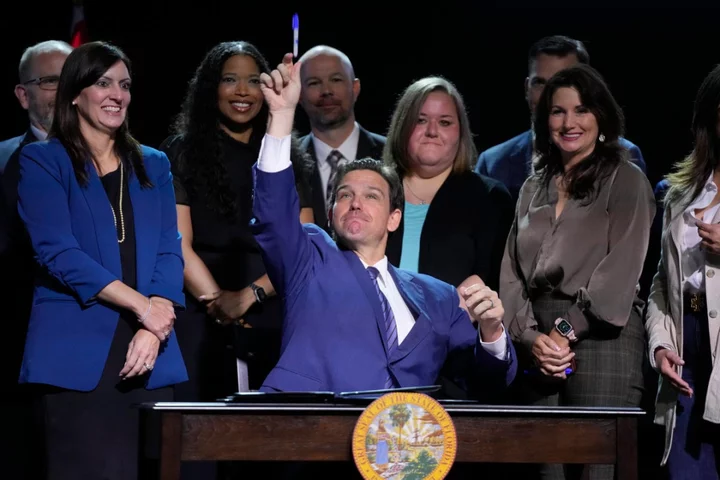
DeSantis reacts to Trump implying Florida abortion ban is ‘too harsh’ as 2024 fight heats up
Gov Ron DeSantis criticised Donald Trump on Tuesday for implying Florida's new six-week abortion ban is “too harsh,” stepping up his attacks on the former president as he prepares to challenge him for the 2024 Republican nomination. Mr DeSantis was responding to a question about Mr Trump's comments in an article published Monday by The Messenger about the six-week ban the Florida governor recently signed into law. “Many people within the pro-life movement feel that that was too harsh,” Trump told the online outlet. Mr DeSantis contended the law has widespread support among opponents of abortion and noted the former president didn't say what limits he would back on the procedure. “Protecting an unborn child when there’s a detectable heartbeat is something that almost 99 per cent of pro-lifers support,” Mr DeSantis said at a news conference in Florida, taking questions after he signed a measure to combat human trafficking. “As a Florida resident, you know, he didn’t give an answer about, ‘Would you have signed the heartbeat bill that Florida did, that had all the exceptions that people talk about?’” Mr DeSantis added. The rivalry between Mr Trump and Mr DeSantis is heating up as the Florida governor nears a decision on a 2024 presidential bid. Mr DeSantis allies believe he will launch his candidacy as soon as this week, although an announcement could come closer to the end of the month. Abortion has been an early flashpoint in the still-forming Republican primary field ahead of the first presidential election since the Supreme Court overturned Roe v Wade. The bickering showcases the GOP's ongoing internal debate over hard-line abortion restrictions, which may be popular in a Republican primary but could create problems in a general election for the party's eventual nominee. The bill signed into law last month by Mr DeSantis would ban abortions after six weeks of pregnancy. It will take effect only if the state’s current 15-week ban is upheld in a legal challenge before the state Supreme Court, which is controlled by conservatives. “Ron DeSantis is flailing in the polls and is closer to the bottom of the pack than he is to President Trump, who is dominating in every single poll,” Trump campaign Steven Cheung said when asked to respond to DeSantis' remarks. Cheung pointed out an anti-abortion group's recent characterization of Trump's presidency as “the most consequential in American history for the pro-life cause.” Mr Trump has referred to himself as “the most pro-life president in American history,” as his three nominations of conservative judges to the Supreme Court paved the way for the end of legalized abortion nationwide. But in the early months of his 2024 bid, Mr Trump has often sidestepped the issue of abortion, even as Republicans across the country celebrate the Supreme Court decision stripping federal constitutional rights to the practice. In Iowa in March, he repeatedly refused to say whether he would support a federal law restricting abortion in every state — a move that anti-abortion activists have been demanding of the GOP’s presidential contenders. “We’re looking at a lot of different things," he said when asked by The Associated Press whether he supports a federal abortion ban. Last week during a primetime CNN town hall in New Hampshire, Mr Trump continued to avoid specifics on a national ban, repeatedly saying he would “do what’s right,” without specifying what that was. As he gets closer to an announcement, Mr DeSantis has been escalating his criticism of Mr Trump, who for months has been attacking him directly and through groups supporting his candidacy. Last week in Iowa, as perilous weather sidelined Mr Trump’s trip to the state, Mr DeSantis highlighted the GOP’s recent string of electoral losses — a clear knock on the former president. “We must reject the culture of losing that has impacted our party in recent years. The time for excuses is over,” Mr DeSantis said at an event in Sioux Center. “If we get distracted, if we focus the election on the past or on other side issues, then I think the Democrats are going to beat us again.” Read More Trump news – live: John Durham’s report on Trump-Russia probe attacks FBI as Giuliani accused of sexual abuse Oral sex on Trump calls and pardons for sale: The most disturbing allegations from the Giuliani lawsuit Disney asks judge to dismiss DeSantis-appointed board's lawsuit in latest tit-for-tat Ukraine war’s heaviest fight rages in east - follow live Charity boss speaks out over ‘traumatic’ encounter with royal aide
2023-05-17 22:26
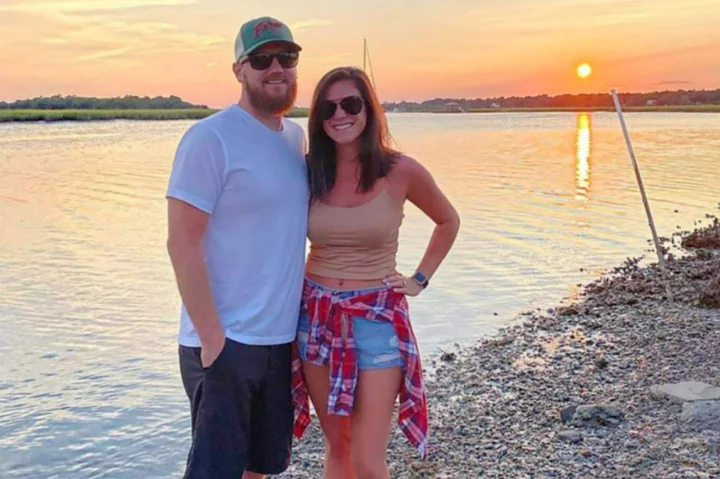
Man whose wife was killed in wedding night crash speaks out on horrific ordeal
A man who was severely injured and whose wife was killed in an auto accident on the night of their wedding in South Carolina is describing his experience. “My body’s getting back to where I can manage, I guess,” Aric Hutchinson told WCSC on Saturday during a memorial for his wife Samantha Miller, 34, held in Folly Beach, South Carolina. “It’s just as good as I can feel with the situation, but obviously, today and the outpouring of people was just amazing,” he added. “I know Sam would love it.” The beach on the island off the coast of Charlotte North Carolina was where the couple was married. On 28 April, Mr Hutchinson, Miller, and two others were leaving their wedding reception in a golf cart equipped with lights and licensed to drive at night. Police say Jamie Lee Komoroski, 25, slammed into the cart from behind, sending Mr Hutchinson flying 100 yards away from the vehicle. He suffered a brain injury and broken bones as a result of the crash, and was in a wheelchair at Saturday’s memorial. Ms Komoroski, who was allegedly drunkenly driving 65mph in a 25mph zone in a rental car, was arrested and charged with one count of reckless homicide and three counts of felony DUI resulting in great bodily harm. Witnesses told police the crash was like a “loud explosion going off,” while another described Ms Komoroski saying aloud, "I did nothing wrong”. Ms Komoroski had a blood alcohol level three times the legal limit in South Carolina, according to police, and told police she had multiple drinks the night of the crash after refusing to perform a field sobriety test. "Words cannot express how devastated we are by her loss," XenTegra, the North Carolina IT company where Miller worked, said in a statement to NBC News. “She carried a light about her, one that shined so brightly upon everyone with whom she interacted. Simply put, Samantha brought an abundance of joy and laughter to the workplace.” Read More Drunk driver who killed bride on wedding day had blood alcohol level three times over the legal limit Newlywed bride killed after drunk driver hits her golf cart immediately after wedding Family of dead bride urges drivers not to drive drunk
2023-05-17 12:19

Nebraska Republicans approve combined gender-affirming care ban and anti-abortion bill after epic filibuster
For three months, a group of Nebraska lawmakers have ground nearly all legislative business in the state to a halt, grabbing the nation’s attention with a remarkable filibuster to stifle a bill that would end gender-affirming care for young transgender people. Late Tuesday 16 May, Republican lawmakers broke through, advancing a bill that not only bans gender-affirming care for trans people under 19 years old but also tacks on an amendment to outlaw abortion at 10 weeks of pregnancy and hands the state’s GOP-appointed medical officer the authority to set the rules for affirming care for trans youth. Lawmakers approved the amended version of legislative bill 574 by a vote of 33-14. The measure will go to a final round of votes before it heads to the desk of Republican Governor Jim Pillen, who intends to sign it into law. Hundreds of protesters filled the capital in Lincoln, standing outside the doors and in the gallery above lawmakers while chanting “one more vote to save our lives”; only one senator would have had to defect from supporters of the bill to kill the legislation. The vote – on the 78th day of a 90-day session – followed a series of maneuvers that opponents argued were bending and breaking the rules of the state legislature to hammer through the legislation and avert the filibuster, which would allow opponents to occupy their allotted time to speak the bill to death. “What you are attempting to do today is the lowest of the absolute lows,” state Senator Machaela Cavanaugh, who spearheaded the filibuster, told Republican lawmakers. “You literally have to cheat at every moment of this debate in every possible way. … You are allowing it to happen,” she added. “You do literally have blood on your hands, and if you vote for it, you will have buckets.” State Senator Megan Hunt, the first openly LGBT+ member of the state legislature and the mother of a trans child, lambasted lawmakers for their “escape routes” from the capitol to avoid facing protesters. “If you can’t go out and face them, you are not worthy,” she said. “Your legacy is filth.” In a statement following the vote, Governor Jim Pillen called the bill “an important step” to “protect” the future of the state’s children. Opponents of the bill forcefully opposed the inclusion of an abortion ban in a bill targeting gender-affirming care, two wholly separate issues combined into one, “but you all don’t care,” Ms Cavanaugh told Republican lawmakers. “You don’t care about due process, you don’t care about the people of Nebraska,” she added. “All you care about is the governor.” Abortion rights advocates and transgender rights advocates have frequently underscored the fact that anti-abortion measures and legislation targeting LGBT+ people are driven by the same lawmakers and activist groups, relying on similar arguments to restrict access to healthcare, with measures that have dominated state capitals across the country over the last few years. Lawmakers initially were set to only debate the gender-affirming care bill, which already went through two of three rounds of debate and votes. But legislative rules prohibit amendments on a final round, and opponents of the bill planned to filibuster through all two hours of debate to continue to block it. Last month, the filibuster blocked a measure from anti-abortion lawmakers to ban abortion at roughly six weeks of pregnancy. Attaching another anti-abortion measure, this time at roughly 10 weeks, gave proponents of the bill a second chance of both advancing an anti-abortion law and the gender-affirming care ban, marrying two controversial measures to get to the necessary 33-vote threshold to advance. In February, Ms Cavanaugh vowed to “burn the session to the ground” if the ban on gender-affirming care advanced, launching an epic filibuster that blocked every bill until the measure was withdrawn or defeated. State Senator Kathleen Kauth, an Omaha Republican who proposed the bill targeting gender-affirming care, said the amended version would protect children from what she called a “social contagion.” “Kids deserve the right to grow up and not deal with this until they are adults and can make informed decisions,” said Ms Kauth, who did not mention the fact that such decisions are made with families and their doctors. The anti-abortion measure provides no exceptions for pregnancies with fatal fetal anomalies and does not explicitly protect doctors who perform abortions from criminal prosecution. “What is wrong with you?” said Ms Hunt, calling the combined bill a “desperate attempt to institute an abortion ban that is unpopular, unnecessary, and unsafe.” More than a dozen states, mostly in the US South, have severely restricted or effectively outlawed abortion in the year after the US Supreme Court struck down Roe v Wade, which affirmed a constitutional right to abortion access. Nebraska’s legislation also joins a nationwide campaign that has seen hundreds of bills aimed at LGBT+ people, particularly at young trans people, filed in nearly every state within the last two years. At least 15 states have enacted laws or policies banning gender-affirming care for young trans people, and more than a dozen others are considering similar measures. Court injunctions have blocked bans from going into effect in three states. More than half of all trans youth in the US between the ages of 13 and 17 are at risk of losing access to age-appropriate, medically necessary and potentially life-saving gender-affirming healthcare in their home state, according to the Human Rights Campaign. The onslaught of legislation and volatile political debate surrounding the bills have also negatively impacted the mental health of an overwhelming majority of young trans and nonbinary people, according to polling from The Trevor Project and Morning Consult. A separate survey from The Trevor Project found that 41 per cent of trans and nonbinary youth have seriously considered attempting suicide over the last year. Read More Inside the ‘mentally exhausting’ protest shutting down Nebraska’s anti-trans legislation Inside Montana’s ‘disturbing’ attack on trans kids and the campaign to silence lawmaker Zooey Zephyr Exclusive: Zooey Zephyr responds to her political silencing and Montana’s attacks on trans children: ‘I show up with my head held high’ Anti-abortion laws harm patients facing dangerous and life-threatening complications, report finds
2023-05-17 11:27
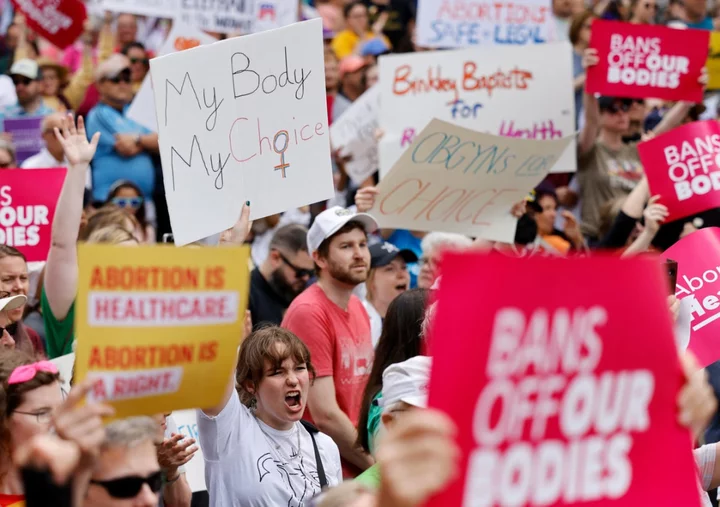
Anti-abortion laws harm patients facing dangerous and life-threatening complications, report finds
Healthcare providers caring for pregnant patients in the months after the US Supreme Court’s decision to strike down Roe v Wade have been unable to provide standard medical care in states where abortion is effectively outlawed, leading to delays and worsening and dangerous health outcomes for patients, according to an expansive new report. In the wake of the Supreme Court’s ruling last year, individual reports from patients and providers have shed some light on the wide range of harm facing pregnant women in states where access to abortion care is restricted or outright banned. But a first-of-its-kind report from the University of California San Francisco captures examples from across the country, documenting 50 cases in more than a dozen states that enacted abortion bans within the last 10 months, painting a “stark picture of how the fall of Roe is impacting healthcare in states that restrict abortion,” according to the report’s author Dr Daniel Grossman. “Banning abortion and tying providers’ hands impacts every aspect of care and will do so for years to come,” he said in a statement accompanying the report. “Pregnant people deserve better than regressive policies that put their health and lives at risk.” The report collected anonymised narratives from providers who observed complications facing their patients. The most common scenario involved preterm pre-labor rupture of membranes (PPRM), in which the amniotic membrane surrounding the fetus breaks. In several of the cases, patients developed a severe infection, including cases that put patients in hospital intensive care units. Patients in many cases were instead sent home and told to return to a hospital when labor started or when they experienced signs of an infection. In one case, a patient returned to a hospital’s intensive care unit two days after her water broke at roughly 16 to 18 weeks of pregnancy in a state where abortion is banned. “The anesthesiologist cries on the phone when discussing the case with me,” the physician wrote, according to the report. “If the patient needs to be intubated, no one thinks she will make it out of the [operating room].” The report notes that “miraculously” the patient survived. Following the termination of the pregnancy, the patient asked the doctor whether any of them broke the law. “She asks me: could she or I go to jail for this?” the doctor said, according to the report. “Or did this count as life-threatening yet?” Providers also described other cases where patients showed evidence of inevitable pregnancy loss, but their care teams had their “hands tied” under state laws. Health providers also submitted stories of patients experiencing ectopic pregnancies. Delays to treat one patient resulted in a ruptured ectopic pregnancy that required surgery to remove her fallopian tube. Another patient was denied an abortion for a Caesarean scar ectopic pregnancy, a life-threatening condition where a pregnancy implants in the scar of a prior Caesarean section. Other physicians reported the inability to treat patients with fetal anomalies and patients who faced delays receiving treatment for miscarriages. “Unfortunately, this report confirms that our fears about abortion bans are valid,” said Dr Chloe Zera, a maternal-fetal medicine specialist and associate professor at Harvard Medical School. “As someone who cares for patients who have high-risk pregnancies, I need to be able to provide care consistent with evidence-based guidelines,” she said in a statement accompanying the report. “This research underscores the completely preventable harm that is now happening to our patients because of barriers to abortion care.” The report also outlines the moral dilemmas facing physicians operating in states or treating patients from states that have outlawed the potentially life-saving care they previously provided. Some physicians said they were considering quitting or relocating, or noted the immense coordination required between health providers in multiple states to treat patients, and outlined the ways in which restrictive state laws have complicated other care unrelated to abortion. In one case, a physician refused to remove an intrauterine device for a patient who was between 10 and 12 weeks pregnant, despite the partially expelled IUD posing a risk for infection or miscarriage. “The doctor did not feel comfortable” removing the IUD, one physician wrote, according to the report. “The context provided was concern over the recent changes in law that create [the] possibility for felony charges for providers causing abortion in our state shortly after the Roe decision was overturned.” During a “heated exchange” among health providers, “the doctor [said] the patient had... been examined by the nurse practitioner, who was unable to visualize the IUD, and that ‘even if I could see it and it was easily removable, I wouldn’t remove it because of the law,’” according to the physician’s description in the report. “Abortion bans that block providers from offering standard medical care have the greatest impact in states like Texas that have some of the poorest indicators of maternal health,” according to Dr Kari White, lead investigator of the Texas Policy Evaluation Project at The University of Texas at Austin. “Pregnant people should be able to rely on their healthcare provider to provide the best possible care, regardless of where they live,” she said in a statement accompanying the report. More than a dozen states, mostly in the South, have effectively outlawed or severely restricted access to abortion care after the Supreme Court’s decision in Dobbs v Jackson Women’s Health Organization last June. Read More Alabama Republicans would charge abortion patients with murder under proposed legislation Louisiana Republicans refuse rape and incest exceptions to state’s sweeping anti-abortion law North Carolina governor vetoes 12-week abortion ban, launching Republican override showdown A Texas man sued his ex-wife’s friends for allegedly helping her with an abortion. Now they’re suing him Supreme Court preserves abortion drug approval as legal case plays out
2023-05-17 01:59
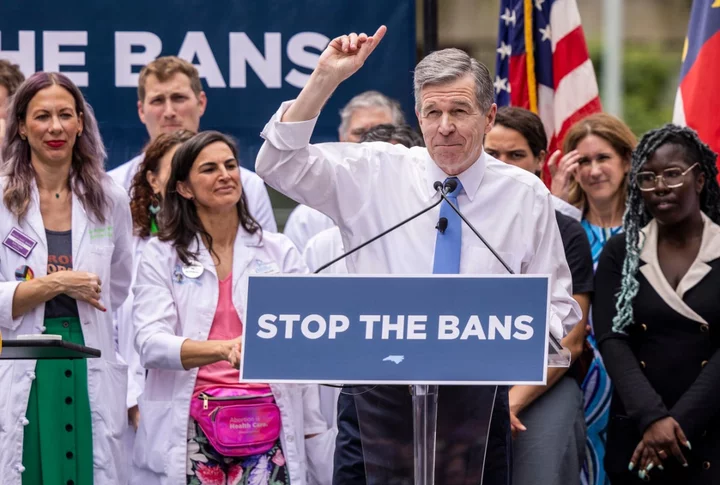
North Carolina governor vetoes 12-week abortion ban, launching Republican override showdown
In front of an exuberant crowd, North Carolina’s Democratic governor vetoed legislation Saturday that would have banned nearly all abortions in his state after 12 weeks of pregnancy. Hundreds of abortion-rights activists and voters watched on a plaza in the capital of Raleigh as Gov Roy Cooper affixed his veto stamp to the bill. The veto launches a major test for leaders of the GOP-controlled General Assembly to attempt to override Cooper’s veto after they recently gained veto-proof majorities in both chambers. The bill was the Republican response to last year’s US Supreme Court decision overturning Roe v Wade. "We’re going to have to kick it into an even higher gear when that veto stamp comes down,” Mr Cooper told the crowd. “If just one Republican in either the House or the Senate keeps a campaign promise to protect women’s reproductive health, we can stop this ban.” Andrea Long, a 42-year-old mother of three from Cary, said she was honored be part of an “electric” crowd on what she called a “historic day for freedom” in North Carolina. “I couldn’t stop crying tears joy seeing the governor hold up the veto stamp, but I know it’s an uphill battle to keep this momentum going,” Ms Long said. Mr Cooper, a strong abortion-rights supporter, had until Sunday night to act on the measure that tightens current state law, which bans most abortions after 20 weeks of pregnancy. Mr Cooper spent the week on the road talking to North Carolinians about the bill’s lesser-known impacts and urging them to apply pressure upon key Republican lawmakers who hesitated about further restrictions during campaigns for office last year. The legislation passed along party lines in the last week in the House and Senate. Republicans have pitched the measure as a middle-ground change to state abortion laws developed after months of private negotiations between House and Senate GOP members. It adds exceptions to the 12-week ban, extending the limit through 20 weeks for rape and incest and through 24 weeks for “life-limiting” fetal anomalies. But Mr Cooper has said repeatedly the details contained in the 47-page bill show that the measure isn’t a reasonable compromise and would instead greatly erode reproductive rights. He cites new obstacles for women to obtain abortions — such as requiring multiple in-person visits, additional paperwork to prove a patient has given their informed consent to an abortion and increased regulation of clinics providing the procedure. Mr Cooper and allies have said those changes in practice will shut down clinics that cannot afford major upgrades mandated by new licensing standards and make it nearly impossible for women who live in rural areas or work long hours to access abortion services. Compared to recent actions by Republican-controlled legislatures elsewhere, the broad prohibition after 12 weeks can be viewed as less onerous to those in other states where the procedure has been banned almost completely. But abortion-rights activists have argued that it’s more restrictive than meets the eye and will have far-reaching consequences. Since Roe was overturned, many patients traveling from more restrictive states have become dependent on North Carolina as a locale for abortions later in pregnancy. Republicans call the legislation pro-family and pro-child, pointing to at least $160m in spending contained within for maternal health services, foster and adoption care, contraceptive services and paid leave for teachers and state employees after the birth of a child. Mr Cooper has singled out four GOP legislators — three House members and one senator — whom he said made “campaign promises to protect women’s reproductive health.” Anti-abortion groups accused Cooper of trying to bully them. One of those House members is Rep Tricia Cotham of Mecklenburg County, who voted for the bill mere weeks after she switched from the Democratic Party to the GOP. The move gave Republicans a veto-proof supermajority if all of their legislators are present and voting. Ms Cotham has spoken out for abortion rights in the past and even earlier this year co-sponsored a bill to codify abortion protections into state law. Rep Ted Davis of Wilmington — another targeted legislator — was the only Republican absent from last week’s initial House vote. The Senate margin already became veto-proof after GOP gains last November. Mr Davis said last fall that he supported “what the law is in North Carolina right now,” which was a 20-week limit. Davis has declined to comment on the bill, but House Speaker Tim Moore said recently that Davis is a “yes” vote for an override. Read More Faith leaders speak out against ‘toxic’ Christian nationalist conference arriving at Trump’s Miami resort GOP boycott in Oregon threatens abortion, transgender bills and protesters' own political careers Louisiana Republicans refuse rape and incest exceptions to state’s sweeping anti-abortion law Ukraine war’s heaviest fight rages in east - follow live Charity boss speaks out over ‘traumatic’ encounter with royal aide
2023-05-14 00:45

Louisiana Republicans refuse rape and incest exceptions to state’s sweeping anti-abortion law
Louisiana Republicans have refused to add exceptions for rape and incest to one of the strictest anti-abortion laws in the country after the US Supreme Court revoked a constitutional right to abortion access. The state’s anti-abortion Democratic Governor John Bel Edwards opposed the exclusion, but he signed the state’s anti-abortion law last year despite pleas from abortion rights advocates to veto the measure. This year, state Rep Delisha Boyd introduced a bill that would amend the law to add exceptions for pregnancies from rape or incest, but lawmakers on a state House committee voted down the proposal, effectively killing it for the remainder of the legislative session. On 10 May, the committee struck down the bill after hearing testimony from rape survivors and abortion rights advocates who shared their experience and urged lawmakers to support survivors. Lawmakers voted 10-5 on party lines to keep exemptions from rape or incest out of Louisiana’s anti-abortion law. Lawmakers also heard from anti-abortion activists and John Raymond, a former Survivor contestant and pastor accused of taping students’ mouths shut and hanging another student by his ankles. Mr Raymond, who has pleaded not guilty to the allegations, told the committee that women will “clamor to put old boyfriends behind bars in order to dispense with the inconvenience of giving birth” if the state allows rape survivors to access abortion care. In this year’s legislative session, lawmakers are considering a package of bills aimed at loosening the state’s near-total ban on legal abortion care, but most of the proposals have been shelved. During the committee hearing, Ms Boyd revealed that she was born after her mother was sexually assaulted when she was 15 years old. “My mother never recovered,” she said. “No one looked after my mother. No one looked out for me.” Republican state Rep Tony Bacala said he opposed the legislation by pointing to Ms Boyd, who was born from rape, as a good person. In a statement, the governor said he was “deeply disappointed” by the vote. “The committee’s decision to prevent this important bill from being debated by the full House is both unfortunate and contrary to the position of a vast majority of Louisianans, who support these exceptions,” he added. “I simply do not understand how we as a state can tell any victim that she must be forced by law to carry her rapist’s baby to term, regardless of the impact on her own physical or mental health, the wishes of her parents, or the medical judgment of her physician,” said the anti-abortion Democratic governor, who signed the law that bans nearly all abortions, without exceptions, last year, despite pleas from abortion rights advocates to veto the bill. “As I have said before, rape and incest exceptions protect crime victims,” he added. Roughly 3 million women in the US have experienced rape-related pregnancy during their lifetime, according to the US Centers for Disease Control and Prevention. Louisiana also had one of the highest maternal mortality rates in the nation, disproportionately impacting Black women, according to the state’s Department of Health. Louisiana is among more than a dozen states, mostly in the South, that have effectively outlawed or severely restricted access to abortion care in the wake of the Supreme Court’s decision last year to reverse the half-century precedent for abortion access affirmed by Roe v Wade. The state also is central to a closely watched case that could determine the future of a widely used abortion drug used in more than half of all abortions in the US. The legal case over the federal government’s approval of mifepristone will return to the Fifth Circuit Court of Appeals in New Orleans on 17 May, the next step in one of the biggest abortion rights cases after the fall of Roe. The Supreme Court’s decision on 21 April maintains the US Food and Drug Administration’s approval of the drug after a federal judge in Texas struck it down in a ruling that would have profound and potentially dangerous consequences for millions of Americans if allowed to go into effect. A three-judge panel at the federal appeals court in Louisiana will hear arguments in the case next week. Read More Alabama Republicans would charge abortion patients with murder under proposed legislation A Texas man sued his ex-wife’s friends for allegedly helping her with an abortion. Now they’re suing him McConnell opposes Alabama Republican's blockade of military nominees over Pentagon abortion policy
2023-05-12 07:21
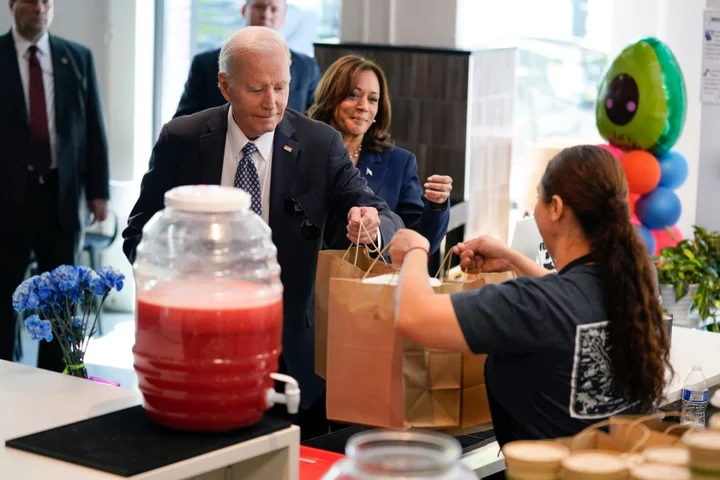
Jill Biden is trying to change Biden’s childlike diet
First lady Jill Biden is reportedly unsatisfied with the substance of President Joe Biden’s diet. According to a report from Alex Thompson at Axios, Ms Biden is urging the president to eat more vegetables and fish with his re-election campaign underway and a vast number of Americans concerned about his age and fitness to serve. Per Axios, Mr Biden is not thrilled about efforts to have him eat healthier. The president’s favourite foods are said to include peanut butter and jelly sandwiches, BLT’s, pizza, and spaghetti with butter and red sauce, as well as ice cream. Whether or not Mr Biden’s diet has any significant bearing on his fitness is difficult to determine. Mr Biden works out daily with a personal trainer, and his doctors have declared that he is in fine health. The extent to which a person’s diet determines their overall health is generally difficult to determine, with a host of other environmental and genetic factors contributing. But the attention being paid to Mr Biden’s diet comes as he embarks on what will be a gruelling re-election campaign that could be complicated by perceptions about his health. According to a recent ABC News/Washington Post poll, two-thirds of Americans believe Mr Biden is too old to serve a second term. Just as importantly, Americans at this stage see former President Donald Trump — Mr Biden’s likely opponent — as mentally sharper. The irony is that Mr Trump, who is just four years younger than Mr Biden, also dealt with consternation over the makeup of his diet when he was president. Mr Trump, who once served a national championship-winning football team a meal of McDonalds products, reportedly so disliked vegetables that his staff resorted to sneaking them into his food. Mr Trump reportedly skipped meals with some frequency, but regularly enjoyed fast food spreads including hamburgers, pizza, fried chicken, and fried fish. There is one other dietary similarity between Mr Biden and Mr Trump: neither man drinks alcohol. Mr Biden reportedly enjoys orange Gatorade, while Mr Trump is reportedly fond of Diet Coke. Read More Trump doctor says staff hid cauliflower in president’s mashed potato in failed attempt to make him lose weight Crabcakes, ribs, banana splits for S. Korea state dinner
2023-05-10 03:21
